外研版(2019)选择性必修第三册Unit 5 Learning from nature Using language课件 (共32张PPT)
文档属性
| 名称 | 外研版(2019)选择性必修第三册Unit 5 Learning from nature Using language课件 (共32张PPT) |  | |
| 格式 | pptx | ||
| 文件大小 | 3.3MB | ||
| 资源类型 | 教案 | ||
| 版本资源 | 外研版(2019) | ||
| 科目 | 英语 | ||
| 更新时间 | 2023-11-06 12:06:35 | ||
图片预览

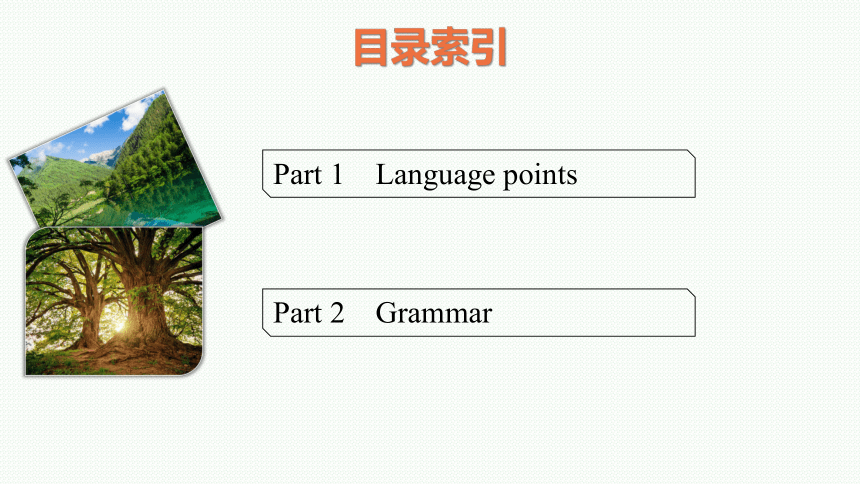
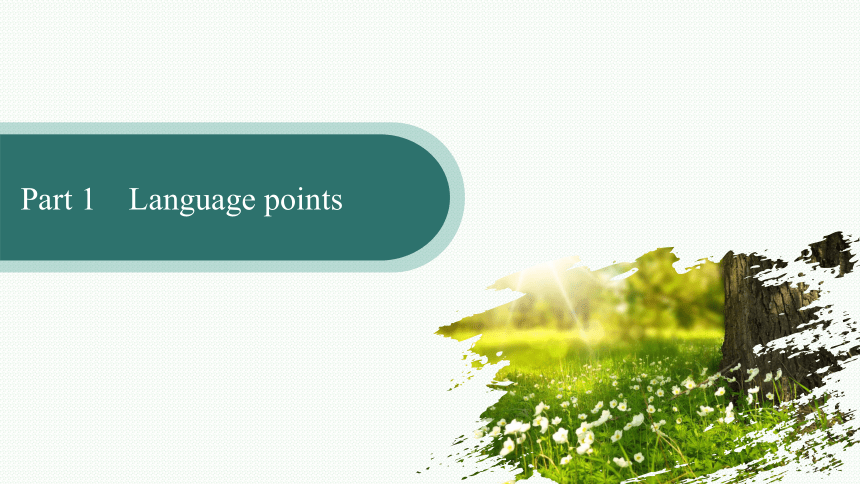
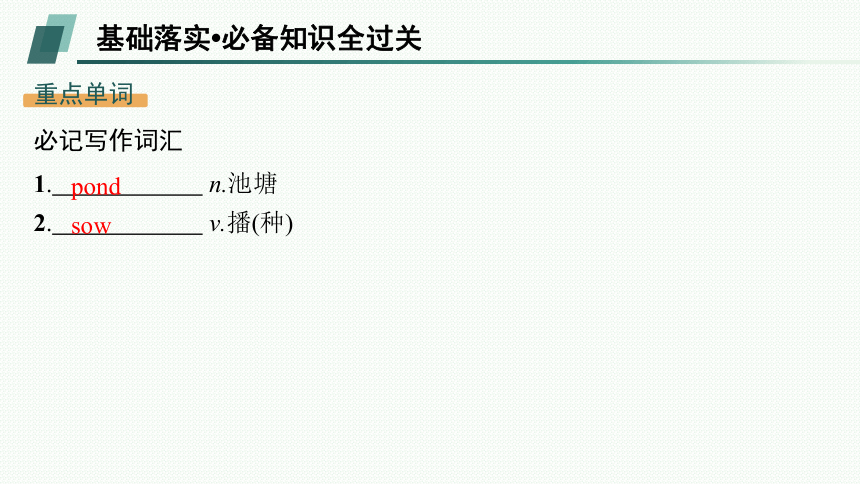
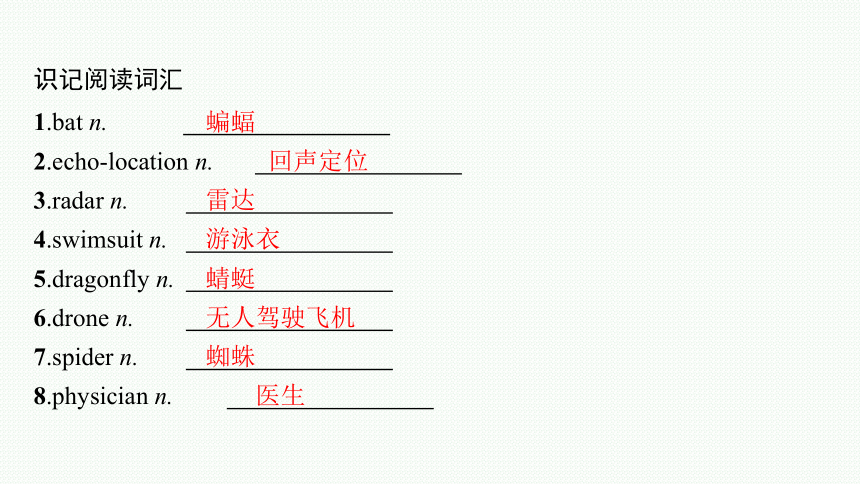
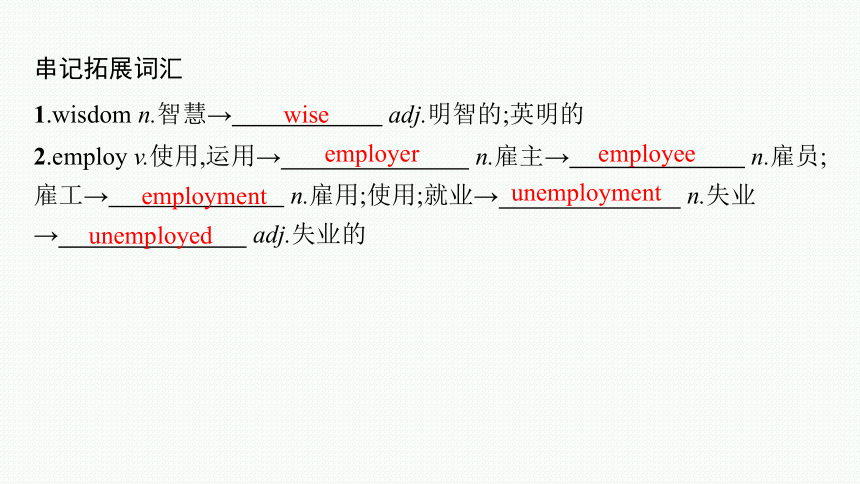
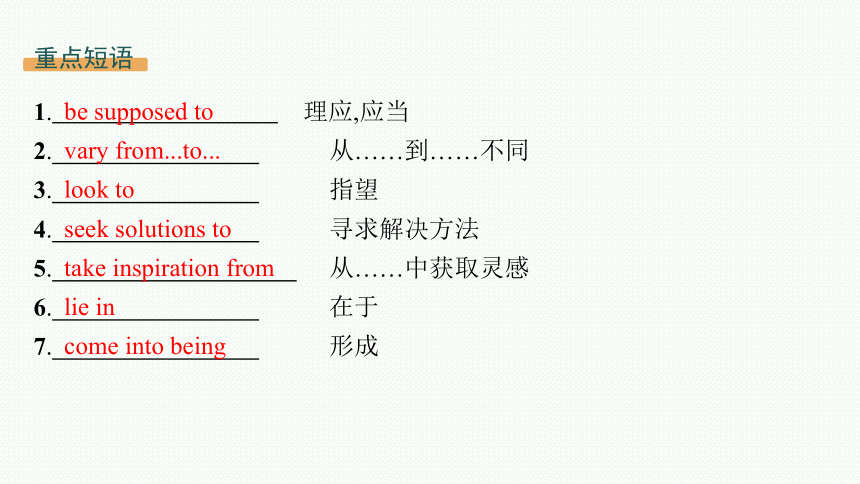
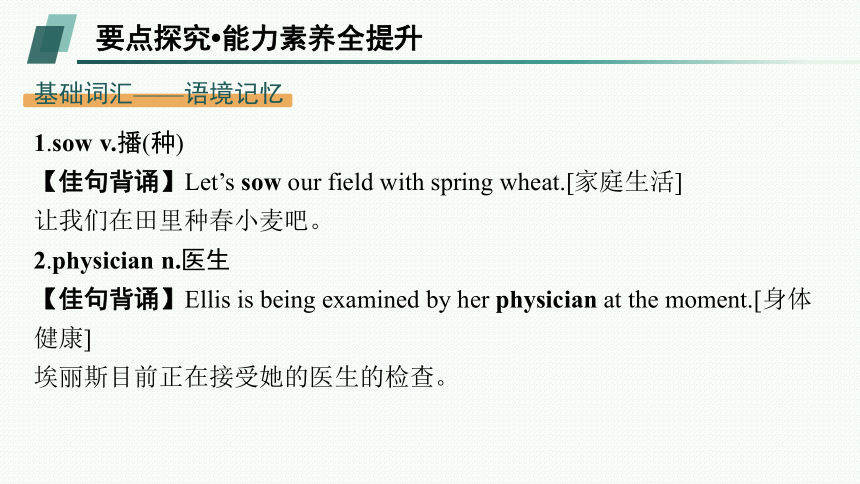

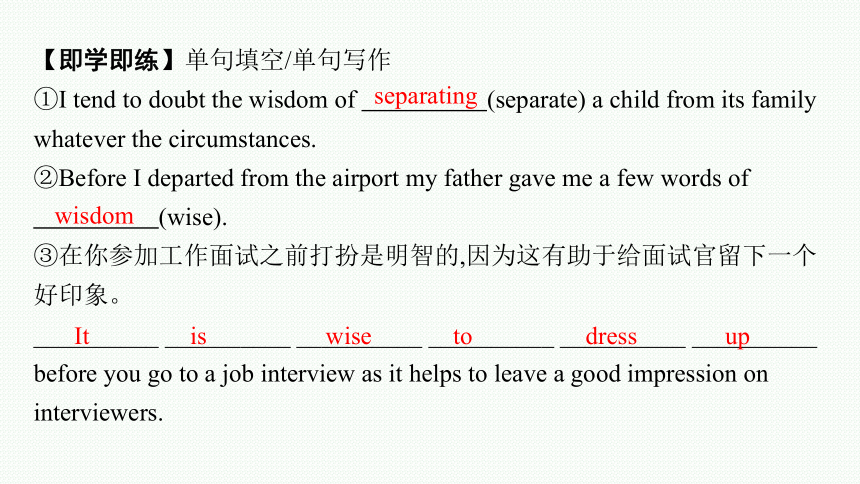
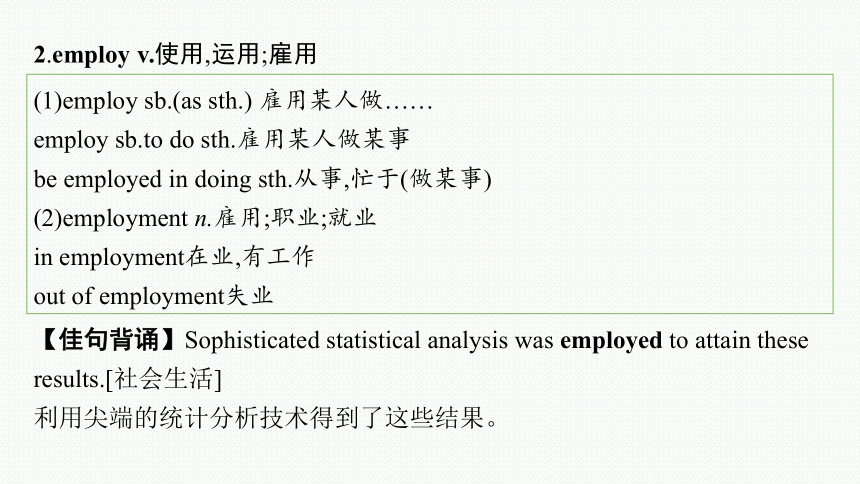
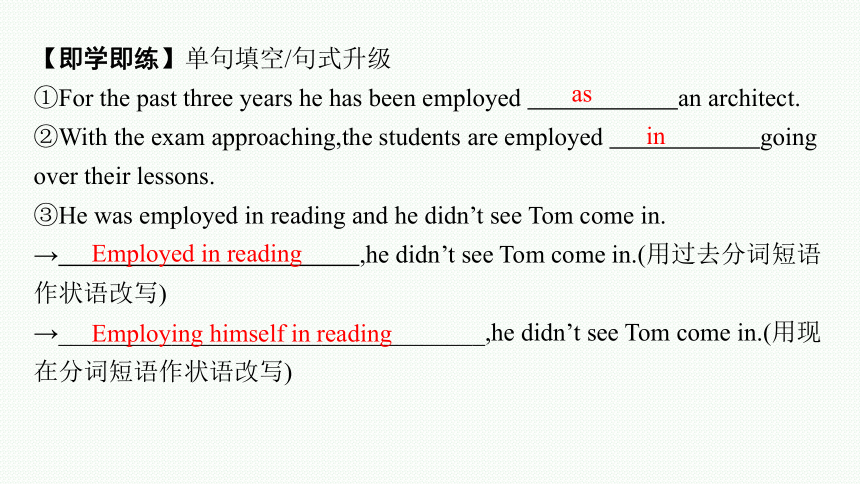
文档简介
(共32张PPT)
Unit 5 Learning from nature
Section B Using language
Part 1 Language points
Part 2 Grammar
目录索引
Part 1 Language points
基础落实 必备知识全过关
重点单词
必记写作词汇
1. n.池塘
2. v.播(种)
pond
sow
识记阅读词汇
1.bat n.
2.echo-location n.
3.radar n.
4.swimsuit n.
5.dragonfly n.
6.drone n.
7.spider n.
8.physician n.
蝙蝠
回声定位
雷达
游泳衣
蜻蜓
无人驾驶飞机
蜘蛛
医生
串记拓展词汇
1.wisdom n.智慧→ adj.明智的;英明的
2.employ v.使用,运用→ n.雇主→ n.雇员;雇工→ n.雇用;使用;就业→ n.失业
→ adj.失业的
wise
employer
employee
employment
unemployment
unemployed
重点短语
1. 理应,应当
2. 从……到……不同
3. 指望
4. 寻求解决方法
5. 从……中获取灵感
6. 在于
7. 形成
be supposed to
vary from...to...
look to
seek solutions to
take inspiration from
lie in
come into being
要点探究 能力素养全提升
基础词汇——语境记忆
1.sow v.播(种)
【佳句背诵】Let’s sow our field with spring wheat.[家庭生活]
让我们在田里种春小麦吧。
2.physician n.医生
【佳句背诵】Ellis is being examined by her physician at the moment.[身体健康]
埃丽斯目前正在接受她的医生的检查。
高频词汇——讲练互动
1.wisdom n.智慧
(1)wisdom of (doing) sth.(做)某事的智慧
words of wisdom至理名言;智慧箴言
(2)wise adj.明智的,充满智慧的
It is wise to do sth.做某事是明智的。
(3)wisely adv.明智地
【佳句背诵】A country should mainly rely on the strength and wisdom of its own people.[观点看法]
一个国家应该主要依靠本国人民的力量和智慧。
【即学即练】单句填空/单句写作
①I tend to doubt the wisdom of (separate) a child from its family whatever the circumstances.
②Before I departed from the airport my father gave me a few words of
(wise).
③在你参加工作面试之前打扮是明智的,因为这有助于给面试官留下一个好印象。
__________ __________ __________ __________ __________ __________ before you go to a job interview as it helps to leave a good impression on interviewers.
separating
wisdom
It is wise to dress up
2.employ v.使用,运用;雇用
(1)employ sb.(as sth.) 雇用某人做……
employ sb.to do sth.雇用某人做某事
be employed in doing sth.从事,忙于(做某事)
(2)employment n.雇用;职业;就业
in employment在业,有工作
out of employment失业
【佳句背诵】Sophisticated statistical analysis was employed to attain these results.[社会生活]
利用尖端的统计分析技术得到了这些结果。
【即学即练】单句填空/句式升级
①For the past three years he has been employed an architect.
②With the exam approaching,the students are employed going over their lessons.
③He was employed in reading and he didn’t see Tom come in.
→ ,he didn’t see Tom come in.(用过去分词短语作状语改写)
→__________________________________,he didn’t see Tom come in.(用现在分词短语作状语改写)
as
in
Employed in reading
Employing himself in reading
Part 2 Grammar
语法冲关 语言规则全理清
情景导入
非谓语动词作主语、宾语和表语
While finding① information is easier than ever,it is harder to research② on the Internet.There is a lot more material available,which means you may be overwhelmed③ with the amount of information.You need to learn④ how to sort through and find the relevant information for your particular project. Also,you need to check⑤ whether it is the information you are satisfied⑥ with.
【语法感悟】
①②为非谓语在句中作 。②中it为形式主语,__________ 为真正的主语。
③⑥为非谓语在句中作 ,表示主语的状态。
④⑤为非谓语在句中作 。
主语
to research
表语
宾语
语法精讲
一、非谓语动词概述
动词的非谓语形式是指不能单独作谓语,但仍保留某些谓语特征的动词形式。非谓语形式没有人称和数的变化,但可以有自己的宾语、状语等。
二、非谓语动词的形式
非谓语形式 主动形式 被动形式
动词不 定式 一般式 to do to be done
进行式 to be doing ——
完成式 to have done to have been done
完成进行式 to have been doing ——
现在分词 一般式 doing being done
完成式 having done having been done
过去分词 done ——
【名师点睛】
非谓语的否定形式,是在非谓语的前面加not,如not to do,not doing,not to be done,not having done。
三、非谓语动词的语法功能
1.非谓语动词作主语
非谓语动词 位置 谓语动词的数 注意
动词-ing(短语) 可位于句首和句末,位于句末时要用it作形式主语。 单个动词-ing(短语)作主语,谓语动词用单数形式。 动词-ing(短语)作主语时,如果要突出动作的执行者,要在其前面加上其逻辑主语,这个逻辑主语通常为名词所有格或形容词性物主代词。
动词不定式
动词不定式作主语时谓语动词通常用单数形式。
Their coming to help was a great encouragement to us.
他们前来帮忙对我们来说是巨大的鼓舞。
To teach you English is my job.
教你们英语是我的工作。
【名师点睛】
动词-ing形式和动词不定式作主语,都可用it作形式主语,经常用于以下句型中:
It is/was no use/good/worth doing sth.
It+be+n.+to do sth.
It+be+important/impossible/difficult/easy/necessary+for sb.to do sth.
It+be+careless/clever/foolish/honest/kind/wise+of sb.to do sth.
It is important for the data to be updated regularly.
经常更新数据是重要的。
2.非谓语动词作宾语
(1)动词不定式作宾语
下列动词后只能用不定式作宾语,请牢记下面的口诀:
决心学会想希望,拒绝设法愿假装。
主动答应选计划,同意请求帮一帮。
decide/determine,learn,want,expect/hope/wish;refuse,manage,care,pretend;
offer,promise,choose,plan;agree,ask/beg,help;afford,strive,happen,wait,
threaten等
If I fail to appear by 7 o’clock,I will not be coming at all.
如果我7点钟没有出现的话,就不会来了。
(2)动词-ing(短语)作宾语
下列动词或动词短语后只能用-ing形式作宾语,请牢记下面的口诀:
考虑建议盼原谅,承认推迟没得想。
避免错过继续练,否认完成就欣赏。
禁止想象才冒险,不禁介意准逃亡。
consider,suggest/advise,look forward to,excuse/pardon;admit,delay/put off, fancy;avoid,miss,keep/keep on,practice;deny,finish,enjoy/appreciate;forbid,imagine,risk;can’t help, mind,allow/permit,escape
【名师点睛】
动词-ing(短语)的复合结构作宾语,其形式有以下几种:
He solved the problem alone without our/us helping him.
他独自解决了那个问题,我们都没有帮他。
(3)下列动词或动词短语后既可以用-ing形式作宾语,也可以用不定式作宾语,但意义上有区别,要特别注意:
后接不定式 后接动词-ing形式
regret to do sth.遗憾要去做某事 regret doing sth.后悔做过某事
forget to do sth.忘记要去做某事 forget doing sth.忘记已做过某事
remember to do sth.记得要去做某事 remember doing sth.记得做过某事
mean to do sth.打算做某事 mean doing sth.意味着做某事
try to do sth.努力/企图去做某事 try doing sth.试着做某事
can’t help(to)do sth.不能帮助做某事 can’t help doing sth.情不自禁地做某事
If we want to catch the 7:30 train,that will mean leaving the house at 6:00.
如果想赶上7:30的火车,那就意味着我们要6:00从家中出发。
(4)动词allow,permit,forbid,advise等后直接跟动词-ing作宾语,如果后面有名词或代词作宾语,其后用不定式作宾语补足语。
Sorry,we don’t allow making noises in the reading room.
对不起,在阅览室里不准喧哗。
(5)need,want,require作“需要”讲,deserve 作“应受,应得”讲时,其后用动词-ing形式的主动形式(doing)或不定式的被动形式(to be done)表被动意义。be worth后也用动词-ing形式的主动形式(doing)表达被动含义。
The window needs/requires/wants to be cleaned/cleaning.
窗户需要擦一下。
(6)think,find,feel,make,believe等动词可用于“动词+it+形容词+to do sth.”结构。在此句型中,it作形式宾语,而真正的宾语是后面的动词不定式。
I think it our duty to obey the laws.
我认为遵守法律是我们的义务。
3.非谓语动词作表语
(1)不定式作表语常用来表示预计要发生的动作,也可用来表示未来的可能性和假设;但当不定式所作的表语仅用来说明主语的内容时,这时的不定式只作单纯的表语,而不具有未来的含义。
Our plan is to make better use of these materials.
我们的计划是更好地利用这些材料。
【名师点睛】
动词不定式作表语省略to的情况:动词不定式作表语时,一般情况下不定式符号to不能省略,但当主语部分含有从句且从句谓语部分有实义动词do的某种形式时,作表语的不定式符号to可保留也可省略。
All we need to do is (to) live each day with passion.
我们需要做的就是充满激情地过好每一天。
(2)动词-ing(短语)作表语多指抽象的、概念性的动作,句子主语常是表示无生命的名词或what引导的名词性从句,表语可以和主语互换位置。
His job is teaching English.(=Teaching English is his job.)
他的工作是教英语。
(3)现在分词和过去分词作表语都是用于回答主语“怎么样”的。现在分词(短语)说明主语的性质或特征,过去分词(短语)往往表示主语所处的状态或状况。
The music they are playing sounds exciting.
他们演奏的音乐听起来令人激动。
【即学即练】单句填空
1.His job is (sit) beside the pianist and turn the pages of the score.
2. (go) to Mount Huangshan reminds me of the popular Beatles’ song “The Long and Winding Road”.
3.You can’t help (wonder) how hard it was for the people then to put all those rocks into place.
4.It is possible (walk) or bike the entire 14 kilometers.
5.It took us about 3 hours (go) all the way around the Xi’an City Wall.
6.During that time, (increase) environmental awareness made it desirable.
to sit
Going
wondering
to walk
to go
increasing
本 课 结 束
Unit 5 Learning from nature
Section B Using language
Part 1 Language points
Part 2 Grammar
目录索引
Part 1 Language points
基础落实 必备知识全过关
重点单词
必记写作词汇
1. n.池塘
2. v.播(种)
pond
sow
识记阅读词汇
1.bat n.
2.echo-location n.
3.radar n.
4.swimsuit n.
5.dragonfly n.
6.drone n.
7.spider n.
8.physician n.
蝙蝠
回声定位
雷达
游泳衣
蜻蜓
无人驾驶飞机
蜘蛛
医生
串记拓展词汇
1.wisdom n.智慧→ adj.明智的;英明的
2.employ v.使用,运用→ n.雇主→ n.雇员;雇工→ n.雇用;使用;就业→ n.失业
→ adj.失业的
wise
employer
employee
employment
unemployment
unemployed
重点短语
1. 理应,应当
2. 从……到……不同
3. 指望
4. 寻求解决方法
5. 从……中获取灵感
6. 在于
7. 形成
be supposed to
vary from...to...
look to
seek solutions to
take inspiration from
lie in
come into being
要点探究 能力素养全提升
基础词汇——语境记忆
1.sow v.播(种)
【佳句背诵】Let’s sow our field with spring wheat.[家庭生活]
让我们在田里种春小麦吧。
2.physician n.医生
【佳句背诵】Ellis is being examined by her physician at the moment.[身体健康]
埃丽斯目前正在接受她的医生的检查。
高频词汇——讲练互动
1.wisdom n.智慧
(1)wisdom of (doing) sth.(做)某事的智慧
words of wisdom至理名言;智慧箴言
(2)wise adj.明智的,充满智慧的
It is wise to do sth.做某事是明智的。
(3)wisely adv.明智地
【佳句背诵】A country should mainly rely on the strength and wisdom of its own people.[观点看法]
一个国家应该主要依靠本国人民的力量和智慧。
【即学即练】单句填空/单句写作
①I tend to doubt the wisdom of (separate) a child from its family whatever the circumstances.
②Before I departed from the airport my father gave me a few words of
(wise).
③在你参加工作面试之前打扮是明智的,因为这有助于给面试官留下一个好印象。
__________ __________ __________ __________ __________ __________ before you go to a job interview as it helps to leave a good impression on interviewers.
separating
wisdom
It is wise to dress up
2.employ v.使用,运用;雇用
(1)employ sb.(as sth.) 雇用某人做……
employ sb.to do sth.雇用某人做某事
be employed in doing sth.从事,忙于(做某事)
(2)employment n.雇用;职业;就业
in employment在业,有工作
out of employment失业
【佳句背诵】Sophisticated statistical analysis was employed to attain these results.[社会生活]
利用尖端的统计分析技术得到了这些结果。
【即学即练】单句填空/句式升级
①For the past three years he has been employed an architect.
②With the exam approaching,the students are employed going over their lessons.
③He was employed in reading and he didn’t see Tom come in.
→ ,he didn’t see Tom come in.(用过去分词短语作状语改写)
→__________________________________,he didn’t see Tom come in.(用现在分词短语作状语改写)
as
in
Employed in reading
Employing himself in reading
Part 2 Grammar
语法冲关 语言规则全理清
情景导入
非谓语动词作主语、宾语和表语
While finding① information is easier than ever,it is harder to research② on the Internet.There is a lot more material available,which means you may be overwhelmed③ with the amount of information.You need to learn④ how to sort through and find the relevant information for your particular project. Also,you need to check⑤ whether it is the information you are satisfied⑥ with.
【语法感悟】
①②为非谓语在句中作 。②中it为形式主语,__________ 为真正的主语。
③⑥为非谓语在句中作 ,表示主语的状态。
④⑤为非谓语在句中作 。
主语
to research
表语
宾语
语法精讲
一、非谓语动词概述
动词的非谓语形式是指不能单独作谓语,但仍保留某些谓语特征的动词形式。非谓语形式没有人称和数的变化,但可以有自己的宾语、状语等。
二、非谓语动词的形式
非谓语形式 主动形式 被动形式
动词不 定式 一般式 to do to be done
进行式 to be doing ——
完成式 to have done to have been done
完成进行式 to have been doing ——
现在分词 一般式 doing being done
完成式 having done having been done
过去分词 done ——
【名师点睛】
非谓语的否定形式,是在非谓语的前面加not,如not to do,not doing,not to be done,not having done。
三、非谓语动词的语法功能
1.非谓语动词作主语
非谓语动词 位置 谓语动词的数 注意
动词-ing(短语) 可位于句首和句末,位于句末时要用it作形式主语。 单个动词-ing(短语)作主语,谓语动词用单数形式。 动词-ing(短语)作主语时,如果要突出动作的执行者,要在其前面加上其逻辑主语,这个逻辑主语通常为名词所有格或形容词性物主代词。
动词不定式
动词不定式作主语时谓语动词通常用单数形式。
Their coming to help was a great encouragement to us.
他们前来帮忙对我们来说是巨大的鼓舞。
To teach you English is my job.
教你们英语是我的工作。
【名师点睛】
动词-ing形式和动词不定式作主语,都可用it作形式主语,经常用于以下句型中:
It is/was no use/good/worth doing sth.
It+be+n.+to do sth.
It+be+important/impossible/difficult/easy/necessary+for sb.to do sth.
It+be+careless/clever/foolish/honest/kind/wise+of sb.to do sth.
It is important for the data to be updated regularly.
经常更新数据是重要的。
2.非谓语动词作宾语
(1)动词不定式作宾语
下列动词后只能用不定式作宾语,请牢记下面的口诀:
决心学会想希望,拒绝设法愿假装。
主动答应选计划,同意请求帮一帮。
decide/determine,learn,want,expect/hope/wish;refuse,manage,care,pretend;
offer,promise,choose,plan;agree,ask/beg,help;afford,strive,happen,wait,
threaten等
If I fail to appear by 7 o’clock,I will not be coming at all.
如果我7点钟没有出现的话,就不会来了。
(2)动词-ing(短语)作宾语
下列动词或动词短语后只能用-ing形式作宾语,请牢记下面的口诀:
考虑建议盼原谅,承认推迟没得想。
避免错过继续练,否认完成就欣赏。
禁止想象才冒险,不禁介意准逃亡。
consider,suggest/advise,look forward to,excuse/pardon;admit,delay/put off, fancy;avoid,miss,keep/keep on,practice;deny,finish,enjoy/appreciate;forbid,imagine,risk;can’t help, mind,allow/permit,escape
【名师点睛】
动词-ing(短语)的复合结构作宾语,其形式有以下几种:
He solved the problem alone without our/us helping him.
他独自解决了那个问题,我们都没有帮他。
(3)下列动词或动词短语后既可以用-ing形式作宾语,也可以用不定式作宾语,但意义上有区别,要特别注意:
后接不定式 后接动词-ing形式
regret to do sth.遗憾要去做某事 regret doing sth.后悔做过某事
forget to do sth.忘记要去做某事 forget doing sth.忘记已做过某事
remember to do sth.记得要去做某事 remember doing sth.记得做过某事
mean to do sth.打算做某事 mean doing sth.意味着做某事
try to do sth.努力/企图去做某事 try doing sth.试着做某事
can’t help(to)do sth.不能帮助做某事 can’t help doing sth.情不自禁地做某事
If we want to catch the 7:30 train,that will mean leaving the house at 6:00.
如果想赶上7:30的火车,那就意味着我们要6:00从家中出发。
(4)动词allow,permit,forbid,advise等后直接跟动词-ing作宾语,如果后面有名词或代词作宾语,其后用不定式作宾语补足语。
Sorry,we don’t allow making noises in the reading room.
对不起,在阅览室里不准喧哗。
(5)need,want,require作“需要”讲,deserve 作“应受,应得”讲时,其后用动词-ing形式的主动形式(doing)或不定式的被动形式(to be done)表被动意义。be worth后也用动词-ing形式的主动形式(doing)表达被动含义。
The window needs/requires/wants to be cleaned/cleaning.
窗户需要擦一下。
(6)think,find,feel,make,believe等动词可用于“动词+it+形容词+to do sth.”结构。在此句型中,it作形式宾语,而真正的宾语是后面的动词不定式。
I think it our duty to obey the laws.
我认为遵守法律是我们的义务。
3.非谓语动词作表语
(1)不定式作表语常用来表示预计要发生的动作,也可用来表示未来的可能性和假设;但当不定式所作的表语仅用来说明主语的内容时,这时的不定式只作单纯的表语,而不具有未来的含义。
Our plan is to make better use of these materials.
我们的计划是更好地利用这些材料。
【名师点睛】
动词不定式作表语省略to的情况:动词不定式作表语时,一般情况下不定式符号to不能省略,但当主语部分含有从句且从句谓语部分有实义动词do的某种形式时,作表语的不定式符号to可保留也可省略。
All we need to do is (to) live each day with passion.
我们需要做的就是充满激情地过好每一天。
(2)动词-ing(短语)作表语多指抽象的、概念性的动作,句子主语常是表示无生命的名词或what引导的名词性从句,表语可以和主语互换位置。
His job is teaching English.(=Teaching English is his job.)
他的工作是教英语。
(3)现在分词和过去分词作表语都是用于回答主语“怎么样”的。现在分词(短语)说明主语的性质或特征,过去分词(短语)往往表示主语所处的状态或状况。
The music they are playing sounds exciting.
他们演奏的音乐听起来令人激动。
【即学即练】单句填空
1.His job is (sit) beside the pianist and turn the pages of the score.
2. (go) to Mount Huangshan reminds me of the popular Beatles’ song “The Long and Winding Road”.
3.You can’t help (wonder) how hard it was for the people then to put all those rocks into place.
4.It is possible (walk) or bike the entire 14 kilometers.
5.It took us about 3 hours (go) all the way around the Xi’an City Wall.
6.During that time, (increase) environmental awareness made it desirable.
to sit
Going
wondering
to walk
to go
increasing
本 课 结 束
